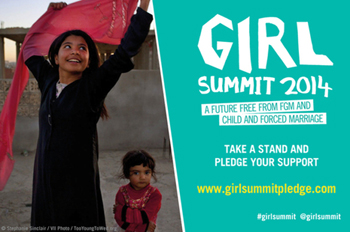
On July 22nd, 2014 the Government of the United Kingdom and UNICEF hosted the 2014 Girl Summit in London aimed to bring together community and government leaders, grassroots and international organizations, and members of both civil society and the private sector to build on current efforts and foster a global movement to end female genital mutilation (FGM) and child, early, and forced marriage (CEFM). The elimination of such harmful practices as FGM and CEFM is key for the realization of a global future in which all girls and women can live free from discrimination and violence – a vision to which the UK government, UNICEF, and other Summit participants pledged their commitment.
The Summit goals were to:
-
Bring together diverse actors in order to share what works in the fight against FGM and CEFM;
-
Agree on an agenda for change; and
-
Engage people – particularly youth – to support and advance that change.
The Summit provided a platform for government representatives from 19 countries, the European Union (EU), and numerous civil society organizations and the private sector to pledge their commitment to ending FGM and CEFM, and launch efforts to increase and produce data and research to inform and support action to end FGM and CEFM as well as to raise awareness globally through a social media campaign. At its conclusion, Summit participants adopted the Girl Summit Charter.
The main emerging themes were:
-
Partnerships - Importance of cooperation and partnership between government and civil society to improve the effectiveness of legislation. Legislation alone is not effective if the community is not aware of such legislation.
-
A girl-centred approach – Legislation cannot be entirely effective without reaching out directly to those affected by FGM and CEFM and creating awareness within their communities. It is necessary to connect on a personal level with these girls and to engage them in health and education systems and other programs.
-
Take into account economic considerations – Importance of considering CEFM as an economic issue as well. Successful initiatives have highlighted the social economic transformation in efforts to end child marriage.
-
Inclusion of men - Men and boys must be educated about the dangers of CEFM, and encouraged to join the efforts to end this practice. Additionally, male perpetrators must be sufficiently punished under the law.
The major challenge facing the elimination of CEFM is the lack of implementation of legislation. While national strategies and action plans are important steps towards eradicating CEFM, these remain insufficient if the necessary measures are not taken to ensure they are comprehensively implemented. Among these measures is the communication and coordination across various governmental ministries, national and local institutions, and with NGOs.

